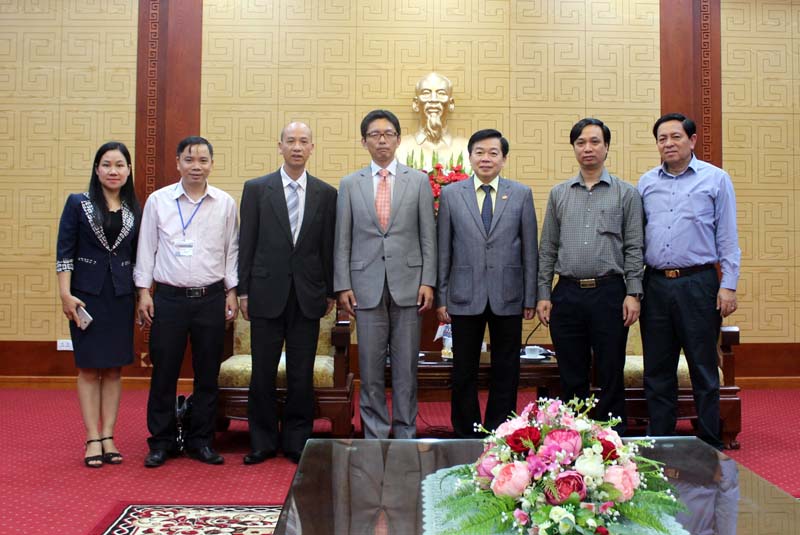
(HBO) – Vice Chairman of the People’s Committee of Hoa Binh Nguyen Van Chuong has held a working session with a Japanese delegation led by Okabe Daisuke, the Minister from the Japanese Embassy in Vietnam.
At the meeting, Chuong showed his
delight to welcome the delegation, while briefing his guests on the socio-economic
situation in the locality.
He said that in investment attraction,
Hoa Binh has been working to improve its investment and business environment to
provide better conditions for enterprises, including those from Japan, to
effectively operate their programmes and projects.
In the coming time, the province hopes
to receive more investment and support from the government as well as investors
of Japan, he said, describing it as an important resource contributing to
boosting the locality’s growth.

On
the occasion of the Lunar New Year, leaders of the provincial People’s
Committee extended New Year wishes to the delegation of Minister Okabe Daisuke
from the Japanese Embassy in Vietnam.
For his part, Okabe Daisuke thanked
leaders of Hoa Binh for their warm welcome, while showing his good impression in
his first visit to the province.
He mentioned two projects funded by the
Japanese Government, which are underway in HoaBinh, including the non-refundable
project to build infrastructure system for Bui village and Yen Phu commune’s
primary school in Lac Son district, and anther to provide medical equipment to the
health sector of Hoa Binh.
Since 1992, the Japanese Government has
launched about 630 non-refundable projects at the local level in Vietnam with a
total investment of over 53 million USD.
Providing information of principle,
content and requirements of non-refundable programmes from the Japanese
Government, the Japanese diplomat suggested that the People’s Committee of Hoa Binh
continue to coordinate closely with the Japanese Embassy in Vietnam to further
promote the resource, thus attracting more investment for Hoa Binh in following
years.
The two sides discussed a number of
issues related to investment attraction and operation of Japanese firms in Hoa Binh,
as well as the efficiency of the assistance and the strengthening of management
over activities of Vietnamese students in Japan.
They agreed to coordinate closely and
effectively to lift up their partnership to a new height in the future./.
The Standing Board of the Hoa Binh provincial Party Committee has agreed in principle on a proposal by the Standing Board of the Party Committee of Hoa Binh city to gather feedback on the city’s 1:2000 zoning plan, which forms part of its broader urban development strategy.
Hoa Binh province has made notable progress in public administration reform and digital government development, with the satisfaction index among citizens and businesses reaching over 84%, according to recent government evaluations.
Thanks to great efforts by local authorities in recent times, the governance and public administration performance of Mai Chau district has been significantly improved.
In the afternoon of June 6, the Party Committee, the People's Council, the People's Committee and the Fatherland Front of Lac Son district solemnly held a meeting to celebrate the 139th anniversary of the district's founding (1886–2025) and the 79th anniversary of the establishment of the district's Party Committee (1946–2025). There was the attendance of Mr. Bui Van Thang, the Vice Chairman of the Provincial People's Council; Mr. Quach Tat Liem, the Vice Chairman of the Provincial People's Committee; Ms. Dang Bich Ngoc, the Deputy Head of the National Assembly Delegation of the province; as well as the former leaders of the province and district through various periods, who are the natives of the district.
Implementing the Politburo’s Resolution No. 57-NQ/TW on breakthroughs in science – technology, innovation, and digital transformation is a golden opportunity for the northern mountainous province of Hoa Binh to renew growth model, improve competitive edge and shorten digital gap.
Resolution 57-NQ/TW, issued by the Politburo on December 22, 2024, identifies sci-tech, innovation, and digital transformation as strategic breakthroughs to build a developed and prosperous nation. In Hoa Binh province, this spirit is not just a slogan, it’s being put into action through concrete initiatives that form a "new development triangle”: digital citizenship, digital economy, and digital administration.



